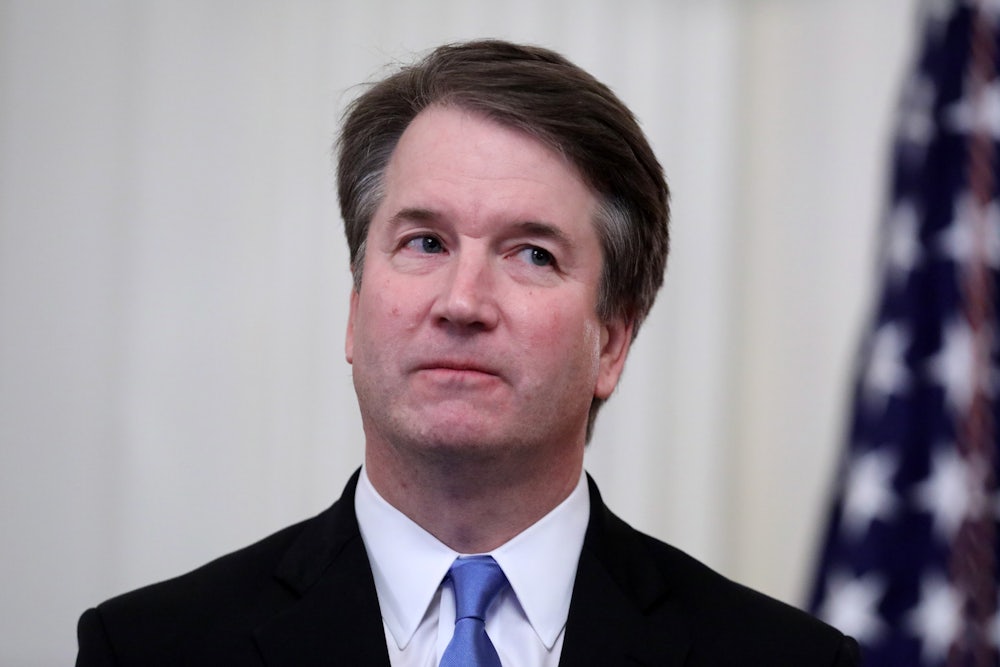It’s been an interesting week for everyone who’d prefer international financial institutions to not do crimes—and not just because the world’s plutocratic elites are meeting in Davos for their annual “What schemes will we come up with next?” confab. The Supreme Court appeared reluctant to rule that a Turkish state-owned bank couldn’t be prosecuted in U.S. courts during oral arguments on Tuesday but gave no clear signs of where and how it would draw a line on legal immunity for foreign state-run entities in U.S. courts.
Sovereign immunity generally prohibits the Justice Department and U.S. states from suing or prosecuting foreign governments in U.S. courts. At issue in Türkiye Halk Bankasi v. United States, however, is whether that also extends to the “instrumentalities” of foreign governments that are not formal agencies but still generally operate at their government’s behest.
The bank in question, which is more commonly known as Halkbank, is a publicly traded company. But a majority of its shares are owned by the Turkish Wealth Fund, which serves as the sovereign wealth fund for the Republic of Turkey. For everyday purposes, however, Halkbank is a semi-independent appanage of the Turkish government. (While the Turkish and U.S. governments use Ankara’s preferred name of “Türkiye,” I’ll use Turkey for the sake of clarity.)
How did Halkbank end up in court? In 2019, federal prosecutors in New York charged the bank and some of its top officials for their role in an alleged scheme to launder billions of dollars of Iranian oil and gas revenue. That laundering helped Iran circumvent the stringent financial and economic sanctions imposed on it by the U.S. and other world powers as part of the negotiations over the Iranian nuclear program. Since some of the transactions passed through U.S. financial institutions, the Justice Department claimed jurisdiction over the case.
Halkbank claimed in response that it was protected by sovereign immunity, a well-established principle in international law by which nation-states cannot face civil lawsuits or criminal prosecution in courts without their own consent. (The federal government and U.S. states also enjoy a similar form of sovereign immunity in U.S. courts, but that immunity is not at issue here.) Sovereign immunity predates the American Revolution and is protected both under common law and by the Foreign Sovereign Immunities Act of 1976, or FSIA.
Lisa Blatt, a veteran Supreme Court appellate lawyer who represented Halkbank, emphasized the historical continuity while addressing the justices on Tuesday. “The U.S. does not dispute that criminal trials against sovereigns were unthinkable in 1789, would violate international law today, are unprecedented anywhere, and would risk retaliation,” she told the court. “But all the same is true for sovereign instrumentalities, which by definition are sovereign.”
Blatt compared Halkbank to the U.S. Import-Export Bank, which Congress created in 1934 to finance international trade with U.S. companies, and implied that U.S. entities could face similar problems overseas. “We have over 90 corporations,” she noted. “We have Voice of America, Export-Import Bank, and one person’s freedom fighter is another person’s terrorist. Our U.S. instrumentalities do stuff abroad and could be seen to aid and abet terrorism.” Her blunt assessment served to emphasize the risk that other countries could retaliate if Halkbank loses.
Justice Brett Kavanaugh, who is known for his expansive view of executive power, appeared skeptical that the Supreme Court could properly intervene in the Turkish bank’s favor. “I think it’s pretty bizarre for this court to tell the president of the United States that even though the Constitution doesn’t prohibit what you’re doing, even though a statute doesn’t prohibit what you’re doing, this court’s going to prohibit your exercise of national security authority,” he told Blatt. “Talk about big steps, that’s huge.”
Chief Justice John Roberts also tried to press Blatt on when and how the courts should be able to tell if a foreign entity is an instrument of another country’s government. She argued that that power was best exercised by the foreign government in question, not the courts. “What I’m trying to prevent is a situation where if a foreign country just bought a U.S. company and had control,” she explained. “I don’t think that means it’s a foreign instrumentality.”
Both sides of the case framed the consequences of the other side’s position in the direst of terms. “If you take the holding below that even though everything happened in Türkiye, [the] commercial activities [exception] applies, it just blows open the FSIA in every county, city, [and] state court,” Blatt warned. That would lead to the risk that thousands of state and local prosecutors could bring criminal charges against foreign governments and risk upending American diplomacy around the world.
Eric Feigin, who argued for the Justice Department, also warned of dangerous consequences. If Halkbank’s understanding of international law prevailed, he told the justices, “any foreign government–owned corporation could become a clearinghouse for any federal crime, including interfering in our elections, stealing our nuclear secrets, or something like here, evading our sanctions and funneling billions of dollars to an embargoed nation, using our banks, and lying to our regulators.” He also noted that only three countries had signed a friend-of-the-court brief backing Halkbank’s proposed outcome, suggesting it was an outlier.
Justice Neil Gorsuch questioned the Justice Department on whether the court should readily embrace the government’s reading of the FSIA. One provision generally states that foreign states “shall be immune from the jurisdiction of the courts of the United States and of the States except as provided [by other sections of the FSIA].” Does that sweeping language apply to both civil and criminal cases? If it does, then that’s a strong point in Halkbank’s favor. If it does not, then that raises questions about whether the FSIA preempts states from prosecuting foreign countries as well.
“If we hold that [Section] 1604 doesn’t apply to criminal cases, then states would be free to try to bring lawsuits against Mexico for this or that, or perhaps China because of COVID, or who knows what a creative state prosecutor might come up with,” Gorsuch explained. Feigin replied that the court typically reads statutes in their entirety, and noted that the FSIA is focused on civil actions and doesn’t address criminal prosecutions at all, suggesting that they remain governed by the common-law principles.
Roberts also again raised an underlying question about the case’s facts, noting that the Turkish government had described Halkbank as an effective arm of the state in its friend-of-the-court brief. “Do they get to have a say in that, or who makes that judgment?” he asked Feigin, who replied that it’s the courts’ responsibility to decide what is and isn’t a foreign instrumentality under the court’s precedents. “That principle dates back to the founding—in fact, before the founding, where it was obviously possible to sue the East India Company,” Feigin added.
And Justice Samuel Alito burrowed into even more thorny questions on international law by suggesting that it wasn’t clear whether state courts are even bound by principles of international law or whether the president could stop a state prosecutor from charging a foreign government. “Under what theory would this state prosecution be preempted by federal law?” he asked Feigin. “The Supremacy Clause applies to the Constitution and the laws of the United States. So what is the law of the United States that would block the state prosecution?” Feigin pointed to the presidency’s general powers over foreign affairs and the Constitution’s ban on most forms of diplomacy for the states.
A few justices, including Gorsuch, Kavanaugh, and Justice Sonia Sotomayor, ultimately floated the prospect of remanding the case back to the Second Circuit Court of Appeals so the judges there could properly decide some aspects of the case first. If they do so, the case could continue to roil U.S. relations with Turkey at a critical juncture, since the Turkish government is both a member of NATO and a regional power in the Middle East. Few of the justices seemed interested in siding with either side in its entirety. A ruling—whether in the form of a middle-of-the-road compromise or a punt back to the lower courts—is expected by June.










